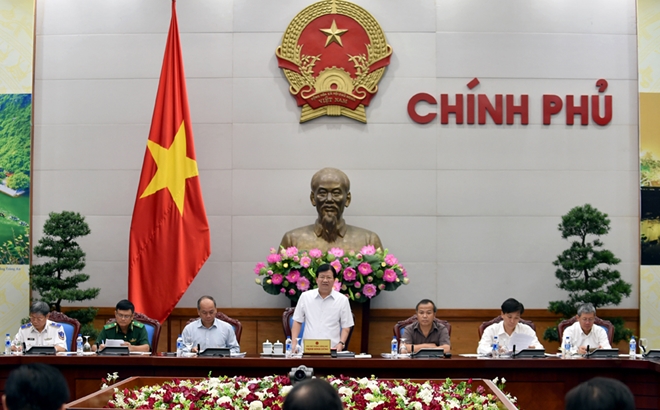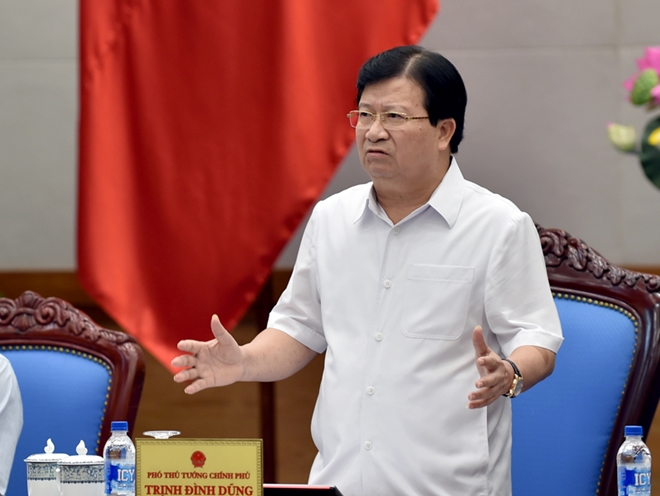Vietnam works to stop fishermen violating other countries’ EEZ
PSNews-On May 30, Deputy Prime Minister Trinh Dinh Dung chaired a meeting at the Government Headquarters to review the implementation of the Prime Minister's Directive on prevention, mitigation and halt of Vietnamese fishermen exploiting maritime resources in the Exclusive Economic Zone (EEZ) of other nations.
 |
The meeting was attended by various leaders of ministries, related sectors and Central agencies and coastal localities.
Vietnam is bestowed upon a 3,260 km long coastline with a 1 million km2 EEZ, 3,000 islands and 2 archipelagos, namely the Spratlys and Paracels.
Vietnam’s sea plays an important role in the country’s strategy on socio-economic development and national security protection.
In recent years, the fisheries has been one of the spearhead economic sectors with a high growth rate, and maritime resources production has been improved, contributing significantly to socio-economic development of the country.
Implementing the "Vietnam Sea Strategy towards 2020", in the past years, the Party and State have adopted many policies to support fishermen. The fishing fleet has been increased in terms of both quantity and quality.
According to data by the Ministry of Agriculture and Rural Development (MARD), in 2016, the whole fishery sector has about 109,000 fishing vessels, with more than 30,000 high-sea fishing ones, providing livelihoods for more than one million people. Additionally, the total fishery production of the country was estimated at over 6.7 million tons (up 2.5% over the same period in 2015), of which fishing accounted for nearly 3.1 million tons (an increase of 1.7% year on year).
Along with the fisheries’ contribution to national socio-economic development, some Vietnamese fishermen carry out illegal fishing activities in other countries’ EEZs.
This issue not only risks the property and lives of fishermen, but also affects Vietnam's prestige in the international arena as well as Vietnam's diplomatic relations with related countries and its exports of seafood products to other countries.
The situation is believed to result from fishermen’s short-sighted views on economic benefits, fishermen’s lack of legal knowledge, ship-owners’ lack of awareness of laws and weaknesses of state management of maritime law enforcement units at the grassroots level.
In addition, developments of local fishing fleets were not planned in accordance with the fishing grounds. As a result, some marine fishery resources have sharply declined. Regulations on the management and exploitation of marine resources have not been amended on time to meet the reality. Meanwhile, functional forces have underperformed statistics on fishing yields and had insufficient capacity to control fishing vessels at sea, which has resulted in many issues.
Directive No. 689 / CT-TTg dated May 18, 2010 and Official Telegraph No. 1329 / CĐ-TTg dated 30 August, 2012 as well as most recently, Official Telegraph No. 732 / CD-TTg dated May 28, 2017 have been seen the Government’s effort to curb fishing vessels from violating foreign waters.
Implementing the Directive No. 689 / CT-TTg dated May 18, 2010 by the Prime Minister, ministries, sectors, and localities have set up interagency working groups at the central and local levels, to inspect on-spot fishing activities in localities and give proposals to policymakers and measures to law enforcement forces to control the situation. As a result, from 2010 to 2014, the situation of fishing at sea was improved.
However, since 2015, the situation has deteriorated and witnessed complicated developments.
After listening to delegates, Deputy PM Trinh Dinh Dung asked relevant ministries, branches and localities to take drastic measures to control and prevent fishermen from violating other nations’ EEZs.
 |
| Deputy Prime Minister Trinh Dinh Dung |
The Deputy PM also asked the Chairmen of the People's Committees of coastal provinces and cities to deploy urgent and effective measures to reduce the number of violating fishing vessels from their localities, saying that they will hold responsibility for their local situation to the Prime Minister.
Marine law enforcement forces were asked to intensify patrol, inspection and control to protect fisheries within Vietnam’s EEZ, and national marine sovereignty as well as the traditional fishing grounds of Vietnamese fishermen.
The Ministry of Foreign Affairs and competent agencies should seek to negotiate with involved countries about delimitation of overlapping maritime zones, as well as to actively protect Vietnamese citizens in accordance with international law, Vietnamese and the involved foreign countries’ laws.
In the long run, the Deputy PM asked to promote dissemination of the laws to raise fishermen’s awareness of law observation.
The Deputy PM urged relevant forces and localities to enhance control and state management; strengthen capacity of law enforcement agencies.
Deputy PM Trinh Dinh Dung also suggested negotiating, signing and establishing a hotline with other countries to solve fishing incidents and stop unreasonable fishing. He also urged to step up negotiations and signings of seafood cooperation agreements with countries inside and outside the region.

